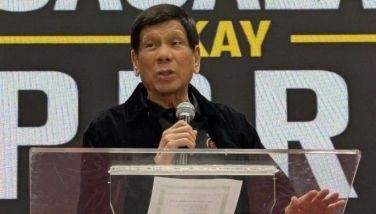Beyond trade and aid
The thirty Filipino students who just left for Europe on an European Union Erasmus Mundus scholarships might be surprised to receive a visit from their President next month. Indeed just three weeks after Catherine Ashton, the EU’s High Representative for Foreign Security Policy and Vice-President of the European Commission visited the Philippines, preparations are underway for a major European trip by President Benigno Aquino III. In mid-September he will visit France, Germany, Spain, Belgium and the seat of the European Institutions in Brussels. The visit comes at a time of a broadening and deepening of the EU-Philippine relationship that reflects our shared interests in a fast-changing globalised world.
During her visit, High Representative Ashton took the opportunity to encourage further economic opening to boost trade and investment and looked in on EU development assistance to the Philippines; but the real drive of her visit was political. She seeks to help take the relationship further “and turn it into a more strategically rounded partnership beyond aid and trade.”
When President Aquino meets the President of the European Council Herman van Rompuy and the President of the European Commission Jose Manuel Barosso in Brussels, they will no doubt continue the political dialogue on the numerous hotspots of the world that Foreign Secretary del Rosario and Mrs Ashton started at their two encounters last month. Libya may be 10,000km from the Philippines and just 300km from the EU’s border, but as the scenes of thousands of Filipinos being evacuated through Malta showed, we can and must be partners in protecting each other’s citizens.
Indeed co-operating to protect our citizens goes beyond guarding them from harm when they are caught in the crossfire of an increasingly instable world. More often than not what they need is protection in their homes and on our streets from dangers that are much less apparent. There are already good examples of what the EU and the Philippines are doing together bilaterally or through ASEAN to counter these threats.
Cybercrime knows no borders but poses great risks to our infrastructure, our economies and our societies which have become so dependent on the reliability of our information systems. The Philippines is receiving special support from EU including legal advice and training to help it accede to the Budapest Convention on Cybercrime which allows us to tackle this threat together at a global level.
Terrorism continues to pose a threat to our societies both in Europe and the Philippines. The EU has been supporting national and regional cooperation in the investigation and prosecution of terrorism cases in both the Philippines and Indonesia. In order to deny terrorists technologies and equipment that can make their attacks more devastating the EU has long been investing in international co-operation on Export Control and dual-use goods aiming to harmonise standards and ensure adequate checks at ports across the globe.
Whether it is keeping the components of weapons of mass destruction out of the wrong hands or preventing accidents, we all have a duty to protect our citizens from the harmful effects from the release of certain chemicals, biological agents as well as radiological or nuclear material.Since 2012 the Philippines has been the EU’s primary partner in the region as host of the Southeast Asian Regional Secretariat of the EU Chemical, Biological Radiological and Nuclear Centre of Excellence that is housed on the grounds of Malacanang.
The South China Sea will no doubt feature in President Aquino’s meetings with European leaders next month. Here again the EU and the Philippines share an interest strengthening co-operation to protect this critical maritime route, preventing piracy and rationalising the overlapping maritime structures in the region to create more secure shipping and trading lines.
As President Aquino travels across Europe he will no doubt meet with the large Filipino communities that have settled in many European countries and contribute to the European economies often in the caring industries but also in business, engineering and seafaring. He will be impressed at the exchanges that take place in the field of culture and the creative arts as well as ever-growing two-way tourism. He will witness for himself the diversity and maturity of the EU-Philippine relationship where it matters most – people to people.
* * *
(Guy Ledoux is the Ambassador of the European Union.)
- Latest
- Trending



























